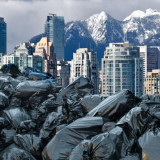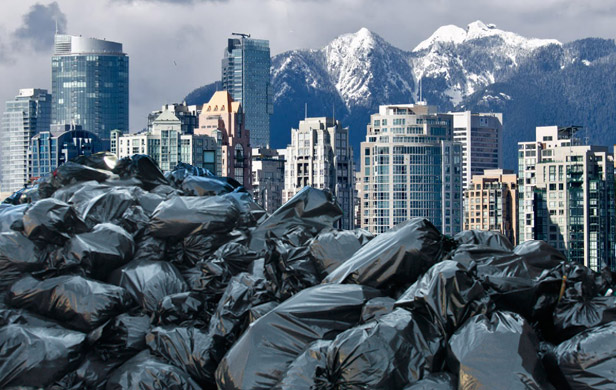Money, money, money. Just like the ABBA song says; it makes the world go round. Our garbage is the newest target for those who love only money and lots of it.
A decade ago some of those sharpest guys in the room, runaways from bankrupting Enron, secured legal authority from President Bush over all the production and distribution of electricity in North America, yes even Canada. The “North American Electricity Reliability Corporation” (NERC) came into being. It was given the “authority to monitor and enforce compliance” of electricity to over 334 million people; installed production capacity of 1,200 gigawatts ; 211,000 miles of high voltage transmission lines and more than one trillion of assets value.
Your Provincial government has legally embraced this model because the corporate interests outside of the province wanted it so. Knowing this might help your understanding of how BC Hydro has become such a financial basket case and blatantly indifferent to its BC customer needs and wishes.
Privatizing paper, garbage, recycling
The newest model of this concentration of taxing power over the citizens of BC, and an abdication of responsibility and accountability by our provincial government, is “Multi Material British Columbia” (MMBC). This “non-profit” enterprise says it “will assume responsibility for managing residential packaging and printed paper (PPP) on behalf of industry in May 2014”. It is an artificially constructed monopoly designed to give private and privileged interest unearned premiums that invariably come from an exaggerated unnecessary amount of economic concentration.
[quote]BC Recycling Regulation was updated in 2011 to shift responsibility for managing the residential recycling of PPP from local governments and their taxpayers to businesses that produce these materials.[/quote]
Don’t like it? How about a $200,000 fine!
Now have you ever read such lovely piece of self-serving propaganda? This is published on behalf of an unelected Board of Directors who are all from large corporations headquartered in Ontario. Just so you know, these people have a big hammer; they will have the legal authority to fine those who are in non-compliance up to $200,000 per event.
So where does this all lead you may well ask? The design is simple. Your Government does not want to have local governments continue to be in charge of garbage disposal because it is too democratic. It wants to enable those who lust after building large incinerators and want the ability of imposing large processing fees for 35 years or more on all of us, to get their way.
By this design, the government is deliberately substituting investment capital for labor, which is ironic given the continuing propaganda by the Premier about job, jobs, jobs. It must be one of those occasions where cabinet members failed to connect the dots; or maybe not.
Erik Andersen on the “Enronization of BC Hydro”



Eric the Con Artist
Read this.
C:\Users\User\Desktop\Brits own USA The Colonel House Report (1919).htm
Shills will be hunted down and hard questions will be asked about
life. Mistakes. Errors against Citizens of Canada.
Have you committed treason? Jes axin, relax, plump Eric.
Can you run, or are you in the waddle stage of life?
You speak well, but you look like a guy that never had to mix it up.
Ya know, ruff stuff. Scary kinda stuff by tough men.
I’m betting you piss your pants and cry.
You guys that believe you have larger brains are funny guys.
Ha ! We’ll see.
A man never knows how he will perform under extreme conditions
until they present themselves and the test begins.
May God have mercy on you.
Resource Recovery Center drop off locations (reverse retail) in evry community in BC.Since you asked start there. There are dozens and dozens of materials that can be recycled that can’t go into curbside. Why on earth would a collection program that can take such few items be imposed on British Columbians?? We don’t need a new hidden consumer tax. We don’t need monoply control. We don’t need vested interests helping to deliver fuel to their pals in the garbage incinerator industry!!! Lots of solutions MMBC weren’t the slightest bit interested as they excluded BC’s vast recycling industry from the conversation. But garbage incinerator types were welcomed! Hhhmmmm?
Incinerators just don’t do the job well. They spew genuinely harmful substances into the environment (heavy metals, strange chemical compounds that come from incomplete combustion of plastics). In order to make an incinerator successful at burring waste adequately, a huge amount of pure fuel must be burned along with the ‘trash’. Even then, that doesn’t stop the heavy metal pollution. I don’t see an easy fix for the ‘trash’ problem. It would seem that the best solution for the foreseeable future is to bury trash in properly constructed landfills. Transportation and handling costs can be significant for overpopulated areas (like Vancouver) but there is a lot of useable space. Recycling of some materials makes sense (like metals, aluminum in particular), but the separation of plastics (perhaps even for PETE plastics) is an exercise in futility. If I have the facts correct, “recycling” of plastics involves massive amounts of labor to separate the plastic “kinds”, and then, there is insufficient demand for the resultant product – some of which gets recycled into new products, but the rest just goes into the landfill … after wasting all that effort to separate those supposedly valuable materials from the rest of the trash… Those who run these operations don’t tell us about this inefficiency – my guess is that they believe that the discipline of making the general population separate and segregate their trash for “recycling” – when it actually ends up back in the trash – well, they believe that is worth the effort “for the cause”, perhaps to “save the planet”. The rest of us need to “shine the light of day” on this process to see if it really is worth doing. This article is less about the waste of ‘recycling’ and more about the politics of trash. I think this article is sounding the alarm about a real problem – the government’s stupid ideas and the private businesses that make a profit out of the governments benign stupidity, or perhaps intentional malicious crony-ism… These rats should be eradicated – both the government and the private industry components.
A couple of footnotes. So far not one realtor has responded to the question; by what % would an incinerator decrease property values? Sorry, wrong, one from Edmonton did say by 10%. The 2014 BC Assessment authority gave Nanaimo and environs a total assessment value, for property tax purposes of about $15.6 billion. A 10% reduction in reaction to the establishment of an incinerator would mean a hit of about $1.6 billion. That is a market determined outcome.
Since an incinerator also produces toxic exhausts and residue that creates additional health and environmental costs and losses in population productivity, we are asking the BC Cancer Agency, Research Department , for help in calculating these future costs. Fingers crossed.
It seems all politicians prefer to “airbrush” away the tough issues but later on complain that no body warned them. Well not this time.
Time to remove ourselve from Ontario … which was a bad idea from the begining, though necessary for a while. We are FAR more connected to those who live west of the Rockies .. all the way down to California. The idea of Ecotopia was written about years ago .. and still looks good. // More immediately, it is important to develop STRONG local politics … the current premier is the furthest from such.
Oh how I wish Mr. Anderson was wrong! But alas, he is not. In fact, the big picture is even worse then anyone could imagine. The “assurances and promises” from MMBC aren’t worth the paper they are written on, which can be used as fuel in an incinerator, should that piece of paper becomes soiled and be placed into the “residual pile” and sold as fuel!
This is the monopoly takeover of recycling in BC with “zero” environmental benefit, with “zero” local economic benefit” and with “zero” incentive to force producers to finally make better packing!
At the start of this PPP EPR process, MMBC refused to remove “incineration” as a disposal option. We knew as far back as 2011 this plan was a deliver program for the much needed high B.T.U. valued material generated from the commingled contamination of the PPP materials, left over after sorting. It is a connect the dots moment.
Any notion, any thought that the current funding for recycling through our taxes, will see any tax relief happen after MMBC launches, is absurd. Taxes more then likely will not go down, and what we will get however is a brand new hidden consumer tax. There is not 1 redeeming quality, not one local benefit to communities in rural, water access, remote, coastal and First Nations communities in BC, not one! But it does seem rather odd, rather coincidental, that at the same time this Ontario bunch hired to throw all British Colombians under the “recycling” train, garbage burner salesmen have swarmed BC, peddling garbage incinerators, much like what happened in Ontario a few years ago!
Connect the dots! This is much much worse then we could possibly imagine!
The people from Ontario are a few light years ahead of us. long ago they legislated curbside Blue Box and limited deposits. The results were good returns, good service, very low costs, simplified billings, and somewhat localized sorting industry. We are Johnny come latelys with piecemeal solutions. Even with a track record, the Ontario people still don’t have a good market for low grade plastics and contaminated material other than energy recovery. You know Zero Waste, you would do better if you cut the politics and produced plausible solutions.